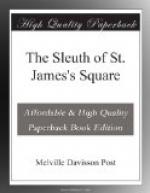Beside the old woman, on a dark wood frame, there was a fire screen made of the pennant of a Highland regiment. Beyond her was a table with a glass top. Under this cover, in a sort of drawer lined with purple velvet, there were medals, trophies and decorations visible below the sheet of glass. And on the table, in a heavy metal frame, was the portrait of a young man in the uniform of a captain of Highland infantry.
The girl who had been speaking sat in a big armchair by this table. One knew instantly that she was an American. The liberty of manner, the independence of expression, could not be mistaken in a country of established forms. She had abundant brown hair skillfully arranged under a smart French hat. Her eyes were blue; not the blue of any painted color; it was the blue of remote spaces in the tropic sky.
The old woman spoke without looking at the girl.
“Then,” she said, “it’s all quite as” — she hesitated for a word - “extraordinary as we have been led to believe.”
There was the slow accent of Southern blood in the girl’s voice as she went on.
“Lady Mary,” she said, “it’s all far more extraordinary than you have been led to believe — than any one could ever have led you to believe. I deliberately picked the man up. I waited for him outside the Savoy, and pretended to be uncertain about an address. He volunteered to take me in his motor and I went with him. I told him I was alone in London, at the Ritz. It was Blackwell’s bank I pretended to be looking for. Then we had tea.”
The girl paused.
Presently she continued: “That’s how it began: You’re mistaken to imagine that Sir Henry Marquis presented me to this American. It was the other way about; I presented Sir Henry. I had the run of the Ritz,” she went on. “We all do if we scatter money. Sir Henry came in to tea the next afternoon. That’s how he met Mr. Meadows. And that’s the only place he ever did meet him. Mr. Meadows came every day, and Sir Henry formed the habit of dropping in. We got to be a very friendly party.”
The motionless old woman, a figure in plaster until now, kneaded her fingers as under some moving pressure. “At this time,” she said, “you were engaged to Tony and expected to be his wife!”
The girl’s voice did not change. It was slow and even. “Yes,” she said.
“Tony, of course, knew nothing about this?”
“He knows nothing whatever about it unless you have written him.”
Again the old woman moved slightly. “I have waited,” she said, “for the benefit of your explanation. It seems as — as bad as I feared.”
“Lady Mary,” said the girl in her slow voice, “it’s worse than you feared. I don’t undertake to smooth it over. Everything that you have heard is quite true. I did go out with the man in his motor, in the evening. Sometimes it was quite dark before we returned. Mr. Meadows preferred to drive at night because he was not accustomed to the English rule of taking the left on the road, when one always takes the right in America. He was afraid he couldn’t remember the rule, so it was safer at night and there was less traffic.




